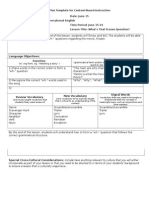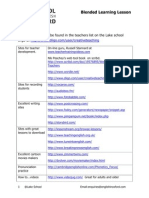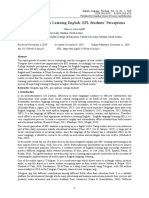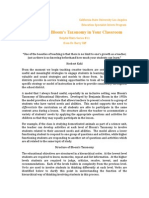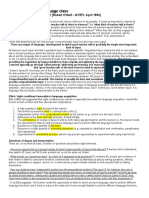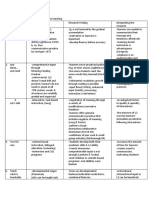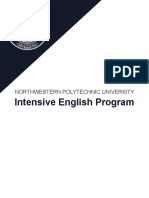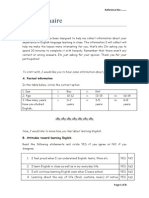Would You Ratvbcbher
Would You Ratvbcbher
Uploaded by
Nicholas CollinsCopyright:
Available Formats
Would You Ratvbcbher
Would You Ratvbcbher
Uploaded by
Nicholas CollinsOriginal Description:
Copyright
Available Formats
Share this document
Did you find this document useful?
Is this content inappropriate?
Copyright:
Available Formats
Would You Ratvbcbher
Would You Ratvbcbher
Uploaded by
Nicholas CollinsCopyright:
Available Formats
Would you rather ?
- Activity: Speaking
- Topic: Would you rather questions
- Age group: Upper secondary; Adults
- Time: 60 minutes (+ follow up)
- Material: Video, transcripts and handout
- Language level: B1 +
- Language point: Hypothetical would; 2nd conditional
jamie
keddie
.com
Page 2
Materials and preparation
1. For this activity, you will need the Simon and Garfunkel song, El Cndor Pasa:
https://www.youtube.com/watch?v=pey29CLID3I
2. You will also need a video in which Jess and James (two friends of mine) contemplate a
would you rather question:
https://www.youtube.com/watch?v=Rq2m4IHLFHU
3. For each student, make a copy of the Handout on page 7, the Adapted video
transcript on page 8, and the Actual video transcript on page 9.
4. Finally, you will need a countdown timer. You may have a function on your mobile
phone or tablet computer. If not, there are many online possibilities such as this one:
http://www.online-stopwatch.com/countdown-timer/
Notes on the activity
This speaking activity involves setting up five mini-discussions in pairs or small groups.
Each of these involves a would you rather question. Although you can choose your own, I
suggest the following:
Would you rather be able to speak English like a native English speaker, or speak 12
other languages at elementary level?
Would you rather spend a month in prison or a year alone on a desert island?
Would you rather walk to work naked or eat a sheep's eye ball?
Would you rather be the world's best singer or the world's best dancer?
Would you rather be able to fly or make yourself invisible?
These questions create a context for talking about hypothetical situations. As
demonstrated in the video transcripts (pages 8 and 9), this requires language such as:
I would / Id
I wouldnt
Would you ?
You would have to
You would be able to / You could
Second conditional structures (e.g. If I had enough books, I would choose a desert
island.)
In this activity, this is the target language. During each mini-discussion, it is your job to
evaluate how well students use it. Make a note of things that you hear strong and weak
examples of language use. This does not have to be restricted to the target language.
After each mini-discussion, offer language feedback: Draw attention to good examples of
language that you heard. In weaker examples, elicit corrections and reformulations when
possible. Remind students to use the target language in the next mini-discussion.
Would you rather ? - Jamie Keddie 2015 - Lessonstream.org
jamie
keddie
.com
Page 3
Activity outline
Part one: Introduction
1. On the board, write the following:
Id rather be a sparrow than a snail.
Id rather be a hammer than a nail.
Id rather be a forest than a street.
2. Say to students: Do you recognise these lines? They are from a famous song. Do you
know which song it is?
Note: A sparrow is a small bird. You can use an image search site to show students a
picture of one.
3. Play El Cndor Pasa by Simon and Garfunkel. Then ask students the following questions:
What is this word? (Answer: Id is a contraction of I would)
Id rather be a sparrow than a snail.
}
Look at these words. Can you think of a different way to say
them? (Possibilities include: I would prefer to be )
Why do you think that Paul Simon would rather be a sparrow
than a snail? (Perhaps because sparrows eat snails?)
Part two: First question
1. Put students into pairs or small groups and say: OK, so I have five questions for you to
discuss. These are all serious questions and I want you to think carefully about them
and share your ideas. To make sure that you do this, I am going to set a timer for
three minutes and you cant stop speaking during that time!
Note: Three minutes is the shortest time that I would recommend on the timer. You could
even go higher. Negotiate this with your students.
Would you rather ? - Jamie Keddie 2015 - Lessonstream.org
jamie
keddie
.com
Page 4
2. Write the first question on the board:
Would you rather be able to speak English like a native English speaker, or speak 12
other languages at elementary level?
3. Make sure that everyone understands the question. Set the timer and then say: Dont
forget to give reasons for your answers. And dont forget to ask your partner(s)
questions about theirs. OK, start speaking! (Start the timer).
4. While students speak, go around the room and monitor their language. Make a note of
things that they say, especially focussing on the target language (see Notes on the
activity).
5. When time is finished, say: OK, so what did you decide? Would you rather be able to
speak English like a native English speaker, or speak 12 other languages at elementary
level? (Invite a few students to share their thoughts).
6. Whenever possible, work with students language. You can also make use of the
examples that you wrote down in step 4. For example, you could say:
Someone said: If I can speak English like a native English speaker
How can we improve that?
Answer: If I could speak English like a native English speaker
Someone said: With 12 languages, I will travel everywhere.
How can we improve that?
Answer: With 12 languages, I would travel the world / go travelling
Part three: The adapted video transcript
1. Give out copies of the Adapted video transcript on page 8. Say: This is a transcript
from a video in which two people discuss a Would you rather question. Read the
dialogue and try to guess what the question is.
If asked, explain the following words:
Adequate: (Before a noun): The necessary amount of
Resources: Things that people and countries need like water, food, energy, etc.
Suncream: (Or sunscreen) Cream for your skin that protects you from the sun.
Scenic: With pleasant, natural things to see (trees, lakes, sea, mountains, etc.)
Whereas: A conjunction used to compare things (similar to on the other hand.)
To work out: To do exercise, especially at the gym.
Your memoirs: Your biography.
Would you rather ? - Jamie Keddie 2015 - Lessonstream.org
jamie
keddie
.com
Page 5
2. After taking students ideas, write the question on the board:
Would you rather spend a month in prison or a year alone on a desert island?
3. Say: In the text, there are a number of second conditional structures. Who can give me
an example of a second conditional structure? (E.g. If I won the lottery, I would travel
the world.) Read the text again and this time, try to find all of the second conditional
structures.
4. Say: Now, compare your answers with a neighbour.
5. Go over the answers:
If you were in prison, you would have company.
If you were on a desert island, you would be left alone.
It would be fun if you had adequate resources.
If I had enough books, I would definitely choose a desert island.
If you were on a desert island, it would be nice and scenic.
If you were in prison, youd get really fit because youd work out all of the time.
6. Say: Now I want you to discuss this same question: Would you rather spend a month in
prison or a year alone on a desert island? As before, you cant stop speaking until you
hear the timer. Give reasons for your answers and ask your partner(s) questions about
theirs.
7. Start the timer and say: OK, start speaking!
8. As before, monitor students use of the target language and make a note of the things
that they say.
9. When the time is finished, find out what students decided and then give language
feedback.
Note: During feedback, you can refer students to the text to show good examples of target
language.
Part four: The remaining questions
Repeat this discussion and feedback process for the remaining questions:
Would you rather walk to work naked or eat a sheep's eye ball?
Would you rather be the world's best singer or the world's best dancer?
Would you rather be able to fly or make yourself invisible?
Would you rather ? - Jamie Keddie 2015 - Lessonstream.org
jamie
keddie
.com
Page 6
Follow up
In this follow up, students explore the differences between the Adapted video transcript
and the actual words in the video. With their teachers guidance, there are a lot of things
to discover. Many of these are described on the Handout on the next page.
Please read the Handout on the next page
before you continue
1. Say: Now, you still havent seen the video where Jess and James share their thoughts.
Before we watch it, have another look at the transcript.
2. Draw students attention to the title on the handout (Adapted video transcript) and
say: Did you notice this word adapted? Can you explain what it means? What is an
adapted text? (Answer: A text which has been changed: the words in the text are
different to the words in the video. It has been changed for learners of English.)
3. Say: OK, I am going to play the video. Watch and listen carefully. I want you to pay
attention and listen to the ways in which Jess and Jamess actual words are different.
4. Play the video two or three times. It has subtitles and you can turn these on after the
first viewing. After viewing, give copies of the Actual video transcript on page 9.
5. Give students some time to compare the two transcripts (the adapted and the actual)
and then ask: So what differences can you describe between the language in the video
and the language in the adapted text?
6. Try to elicit and introduce students to some of the ideas on the Handout on the next
page. You can give them a copy for their reference.
7. Say: I want you to compare the texts again. I want you to choose eight pieces of
language that you like they can be from either version of the text. These can be
words, phrases, idioms, grammar structures, or exchanges between Jess and James. I
want you to choose eight things that you would like to remember after this class.
8. Once students have done this say: Now I want you to compare your choices with a
partner. Tell your partner why you have chosen them.
Note: This follow up could be given as a homework task. That way, students would be able
to access the video and watch it as many times as they like, pause it, etc
Would you rather ? - Jamie Keddie 2015 - Lessonstream.org
jamie
keddie
.com
Page 7
!
t
u
o
d
n
a
H
There are many differences between the Adapted video transcript and the actual words in
the video. Here are some of them:
1. Hypothetical / non-hypothetical
In the Adapted video transcript, all of James and Jesss ideas are expressed hypothetically
(as if they are not real). They make constant use of would, could, past simple, and
second conditional structures. Consistency like this is unusual in natural spoken English. In
the video, Jess and James move in and out of the hypothetical and the non-hypothetical.
Ideas and decisions suddenly become real. They become part of the present.
James:
Jess:
Plus, you have to think suncream ... you know ... you get books in prison.
Then Ill sit in the shade. I dont know. Hmm ...
2. Complete structures
The Adapted video transcript has six complete second conditionals. However, in natural
conversation, this is unusual. It is more usual to use shorter structures such as:
James: And youd feel like a free person.
Jess: ... itd be like a holiday. But then you wouldnt see anyone for two years and
probably go crazy.
In this case, it isnt necessary for Jess and James to use whole conditional structures. That
would involve repeating information. They know that they are talking about desert islands
here.
3. Other features of spoken language
False starts
Jess
Itd be like ... itd be like a holiday.
Ellipsis (missing words) James (On) a desert island, youre left alone.
Language that breaks
the rules
James The problem for prison rather than The problem
with prison.
Finishing each others
thoughts
Youd get really ripped because youd probably ...
Jess
James ... youd work out all the time.
4. Adapted words
Some low-frequency words were replaced with higher-frequency or less cultural synonyms:
depressing rather than grim, fit rather than ripped, choose rather than pick.
5. Problems with the Actual video transcript
In fact, the Actual video transcript is not completely true to the video. It does not
capture moments when Jess and James speak at the same time, or interrupt each other.
Would you rather ? - Jamie Keddie 2015 - Lessonstream.org
jamie
keddie
.com
Page 8
Adapted video transcript
Would you rather ________________________________________________________________________________?
James:
Oh, a month in prison, definitely.
Jess:
Why?
James:
Because, if you were in prison, you would have company. It would only be a month and people
would take care of you. If you were on a desert island, you would be left alone.
Jess:
But that would be fun.
James:
Well, it would be fun if you had adequate resources.
Jess:
If I had enough books, I would definitely choose a desert island.
James:
What about water and food?
Jess:
Well, yeah. Hmm ... I wouldnt be very good at that.
James:
Also, you would have to think about suncream. And in prison, you would get books.
Jess:
Then Id sit in the shade. I dont know. Hmm ...
James:
What would be the problem with prison for you?
Jess:
It would just be a bit depressing. If you were on a desert island, it would be nice and scenic.
James:
Yeah. And youd feel like a free person.
Jess:
Itd be like a holiday. But then you wouldnt see anyone for two years and you would probably go
crazy.
James:
Two years is quite a long time ...
Jess:
Yeah
James:
Whereas one month is ...
Jess:
Maybe Id choose prison as well.
James:
Yeah
Jess:
Also, if you were in prison, youd get really fit because youd work out all of the time.
James:
Yeah, thats true.
Jess:
Really fit and really intelligent.
James:
Yeah. Well, youd only have a month.
Jess:
And you could write your biography.
James:
Youd only have a month, Jess.
Jess:
Oh yeah
Would you rather ? - Jamie Keddie 2015 - Lessonstream.org
jamie
keddie
.com
Page 9
Actual video transcript
Jamie:
Would you rather spend a month in prison or two years alone on a desert island?
James:
Oh, a month in prison, definitely.
Jess:
Why?
James:
Because, a month in prison, you have company for a start. Its only a month long and you get
adequate care taken of you. A desert island, youre left alone. You dont have that.
Jess:
But thats kind of fun.
James:
Well, its fun if you have, you know, adequate resources.
Jess:
If I had enough books, I would definitely choose a desert island.
James:
What about water and food?
Jess:
Well, yeah. As in like ... hmm ... yeah, I wouldnt be very good at that.
James:
Plus, you have to think suncream ... you know ... you get books in prison.
Jess:
Then Ill sit in the shade. I dont know. Hmm ...
James:
What would be the problem for prison for you?
Jess:
It would just be a bit grim. Like at least if you were on a nice island, it would be nice and scenic.
James:
Yeah. And youd feel like a free person.
Jess:
Itd be like ... itd be like a holiday. But then you wouldnt see anyone for two years and probably
go crazy.
James:
Two years is quite a long time ...
Jess:
Yeah
James:
Whereas one month is ...
Jess:
Maybe Id pick prison as well.
James:
Yeah
Jess:
Youd also get really ripped because youd probably ...
James:
... youd work out all the time.
Jess:
Yeah
James:
Yeah, thats true.
Jess:
Really ripped and really intelligent.
James:
Yeah. Well, youve only got a month.
Jess:
And you could write your memoirs.
James:
Youve only got a month, Jess.
Jess:
Oh yeah
Glossary
Adequate (Before a noun): The
necessary amount of
Resources: Things that people and
countries need like food, water, energy,
etc.
Sun cream: (Or sunscreen) Cream for
your skin that protects you from the
sun.
Grim: Depressing.
Scenic: With pleasant, natural things to
see (trees, lakes, sea, mountains, etc.)
Whereas: A conjunction used to
compare things (similar to on the other
hand.)
To pick: to choose.
Ripped: With a muscular abdomen
(quite slang.)
To work out: Do exercise, especially at
the gym.
Your memoirs: your biography: a book
about your life.
Would you rather ? - Jamie Keddie 2015 - Lessonstream.org
jamie
keddie
.com
You might also like
- Jamie Keddie: Splat!Document6 pagesJamie Keddie: Splat!Nicholas CollinsNo ratings yet
- Is Younger Better (Read)Document8 pagesIs Younger Better (Read)Laura Souza100% (2)
- TBL Vs PBLDocument6 pagesTBL Vs PBLMichelleFunesNo ratings yet
- Flipped Class: Shedding Light On The Confusion, Critique, and HypeDocument3 pagesFlipped Class: Shedding Light On The Confusion, Critique, and HypeDr. John SolisNo ratings yet
- Gattegno's Legacy - Young and Messum (2013)Document3 pagesGattegno's Legacy - Young and Messum (2013)Pronunciation Science100% (1)
- Delta Application TasksDocument10 pagesDelta Application TasksstraygattaNo ratings yet
- Multiple Intelligences in The Classroom Article by Jennifer NolenDocument3 pagesMultiple Intelligences in The Classroom Article by Jennifer Nolenapi-533624966No ratings yet
- Tesol Lesson Plan 1Document10 pagesTesol Lesson Plan 1api-289422703No ratings yet
- Forum OkDocument7 pagesForum OkAnonymous hgtHmwNo ratings yet
- Googly EyesDocument7 pagesGoogly EyesciorapelaNo ratings yet
- What Happens Next I4Document6 pagesWhat Happens Next I4GabrielaNo ratings yet
- Using Multimedia in The EFL ClassDocument6 pagesUsing Multimedia in The EFL Classnoeliatintilay6571No ratings yet
- Useful Lesson Materials: Below Are Links To Good Quality Lesson MaterialsDocument2 pagesUseful Lesson Materials: Below Are Links To Good Quality Lesson MaterialsAdriana MarroniNo ratings yet
- Turn Up The Volume: 5 Flexible ESL Activities To Get Students Speaking English Loud and ProudDocument3 pagesTurn Up The Volume: 5 Flexible ESL Activities To Get Students Speaking English Loud and Proudmaia gurchianiNo ratings yet
- PPP Vs TBLDocument137 pagesPPP Vs TBLleonel gavilanesNo ratings yet
- Adjectives & AdverbsDocument8 pagesAdjectives & AdverbsEva PérezNo ratings yet
- Blended LearningDocument2 pagesBlended LearninglakeschoolNo ratings yet
- Communicative Language TeachingDocument9 pagesCommunicative Language TeachingRosalie Jane CervantesNo ratings yet
- Peter Moor-A Task-Based ApproachDocument6 pagesPeter Moor-A Task-Based Approach123sheonaNo ratings yet
- Day 1 Hawaii Lesson PlanDocument2 pagesDay 1 Hawaii Lesson Planapi-686726808No ratings yet
- Group Projects Sample ESL LibraryDocument23 pagesGroup Projects Sample ESL LibraryLorencKolaNo ratings yet
- A Framework To Task-Based LearningDocument11 pagesA Framework To Task-Based LearningNatalia Narváez0% (1)
- Swan A Critical Look at The Communicative Approach 2Document12 pagesSwan A Critical Look at The Communicative Approach 2Charles Cornelius100% (1)
- Telegram App in Learning English: EFL Students' PerceptionsDocument12 pagesTelegram App in Learning English: EFL Students' Perceptionsnur colisNo ratings yet
- Techniques For Teaching Adolescent LearnersDocument9 pagesTechniques For Teaching Adolescent LearnersMartin SketchleyNo ratings yet
- Problem BasedDocument8 pagesProblem BasedImron_09No ratings yet
- "Top Tips For Young Learner Teachers": Teacher Training SlidesDocument81 pages"Top Tips For Young Learner Teachers": Teacher Training SlidesMartin Sketchley100% (3)
- Assessment of Young Learners PDFDocument7 pagesAssessment of Young Learners PDFcalookaNo ratings yet
- NTB Lesson Plan ExampleDocument1 pageNTB Lesson Plan ExampleNurul Intan Fairuz100% (1)
- By Andrew D. Miles: 15 Ways To Improve Communication in Business English WWW - Englishforbusiness.esDocument29 pagesBy Andrew D. Miles: 15 Ways To Improve Communication in Business English WWW - Englishforbusiness.esRuslan ZhivkovNo ratings yet
- AFFIXATIONDocument10 pagesAFFIXATIONHala Tawfik MakladNo ratings yet
- Hints 11 Bloom TaxonomyDocument6 pagesHints 11 Bloom TaxonomyKizzy Anne Boatswain CarbonNo ratings yet
- How To Use Video in The ClassroomDocument2 pagesHow To Use Video in The Classroomnoeliatintilay6571No ratings yet
- Teacher-Talk in The Language ClassDocument2 pagesTeacher-Talk in The Language ClassMarianela Fabro100% (2)
- Lecture Ready 2 AnswerKeyDocument42 pagesLecture Ready 2 AnswerKeyBeste SağlamNo ratings yet
- Gabe l3 Unit 07 TestDocument4 pagesGabe l3 Unit 07 Testallein zeynaNo ratings yet
- Cullen, R. (1994) - Incorporating A Language Improvement Component in Teacher Training Programmes.Document11 pagesCullen, R. (1994) - Incorporating A Language Improvement Component in Teacher Training Programmes.gabar.coalNo ratings yet
- Authentic Video in The Beginning ESOL ClassroomDocument8 pagesAuthentic Video in The Beginning ESOL ClassroomХуршедаNo ratings yet
- Kingore Chapter 6 PresentationDocument10 pagesKingore Chapter 6 Presentationapi-338146197No ratings yet
- Six Proposals For Classroom TeachingDocument2 pagesSix Proposals For Classroom TeachingFebriRotamaSilabanNo ratings yet
- IEP Handbook PDFDocument12 pagesIEP Handbook PDFPranav BajpaiNo ratings yet
- Manchurian Incident Lesson PlanDocument6 pagesManchurian Incident Lesson PlanIgor RadulovicNo ratings yet
- A Model Activity Using The Teaching of Grammar Through DictoglossDocument7 pagesA Model Activity Using The Teaching of Grammar Through DictoglossNina Adzhar100% (1)
- Questionnaire English VersionDocument8 pagesQuestionnaire English VersionvalentinaperNo ratings yet
- Self Access and The Language LearnerDocument175 pagesSelf Access and The Language LearnerRobDavidNovisNo ratings yet
- Task-Based Learning (TBL) Introduction, Examples & AdvantagesDocument8 pagesTask-Based Learning (TBL) Introduction, Examples & AdvantagesyoubelNo ratings yet
- Spirit of DogmeDocument5 pagesSpirit of DogmeSedigheh ShakibNo ratings yet
- Lesson Plan TBL Lesson 3Document4 pagesLesson Plan TBL Lesson 3api-257308424No ratings yet
- Jenkins 2004Document17 pagesJenkins 2004victoria cormickNo ratings yet
- 5th Grade E-PortfolioDocument2 pages5th Grade E-PortfolioChristianne Cowie- KukyNo ratings yet
- Baker & Westrup (2003)Document171 pagesBaker & Westrup (2003)Minh right here Not thereNo ratings yet
- Video in ELT-Theoretical and Pedagogical Foundations: Johanna E. KatchenDocument4 pagesVideo in ELT-Theoretical and Pedagogical Foundations: Johanna E. KatchenIrene Lin FlorenteNo ratings yet
- Thing DoersDocument5 pagesThing DoersxadousNo ratings yet
- Common European Framework (CEFR) 2022 Applied LinguisticsDocument44 pagesCommon European Framework (CEFR) 2022 Applied LinguisticsChristina AgnadaNo ratings yet
- PD Cma 3 1 Classroom Management LecturerDocument25 pagesPD Cma 3 1 Classroom Management Lecturerpeachypeachy100% (1)
- Inspiration CLIL 1 ScienceDocument2 pagesInspiration CLIL 1 ScienceFlorencia LanattiNo ratings yet
- Allwright 1983Document195 pagesAllwright 1983academiadeojosazulesNo ratings yet
- Writing - Penny Ur-Harmer-Scrivener ResumenDocument18 pagesWriting - Penny Ur-Harmer-Scrivener ResumenMiss AbrilNo ratings yet
- Adult Minority Language Learning: Motivation, Identity and Target VarietyFrom EverandAdult Minority Language Learning: Motivation, Identity and Target VarietyNo ratings yet
- 2-in-1 Book Series: Teacher King’s English Beginner Course Book 1 & English Speaking Course Book 1 - Spanish EditionFrom Everand2-in-1 Book Series: Teacher King’s English Beginner Course Book 1 & English Speaking Course Book 1 - Spanish EditionNo ratings yet
- Preston Lee’s 2-in-1 Book Series! Beginner English & Conversation English Lesson 1: 20 For Arabic SpeakersFrom EverandPreston Lee’s 2-in-1 Book Series! Beginner English & Conversation English Lesson 1: 20 For Arabic SpeakersNo ratings yet
- Activity WorksheetsDocument4 pagesActivity WorksheetsNicholas CollinsNo ratings yet
- 2019 Vegetable Catalog: SinceDocument88 pages2019 Vegetable Catalog: SinceNicholas CollinsNo ratings yet
- Talks by Charles Dowding PDFDocument3 pagesTalks by Charles Dowding PDFNicholas CollinsNo ratings yet
- Public Class Hello (Public Static Void Main (String Args) (System - Out.ln ("This Is A Test") ) )Document1 pagePublic Class Hello (Public Static Void Main (String Args) (System - Out.ln ("This Is A Test") ) )Nicholas CollinsNo ratings yet
- 2018 Catalog PDFDocument116 pages2018 Catalog PDFNicholas CollinsNo ratings yet
- Main BedsDocument6 pagesMain BedsNicholas CollinsNo ratings yet
- AdsasdDocument5 pagesAdsasdNicholas CollinsNo ratings yet
- Conducting An Interview 1: Useful Words For Job InterviewsDocument4 pagesConducting An Interview 1: Useful Words For Job InterviewsNicholas CollinsNo ratings yet
- Revision Object & Subject QuestionsDocument1 pageRevision Object & Subject QuestionsNicholas CollinsNo ratings yet
- Meet The Parents Teacher's NotesDocument2 pagesMeet The Parents Teacher's NotesNicholas CollinsNo ratings yet
- Reading Vocabulary - Unit 6.2: Match The Phrases From The Board To Their Definitions BelowDocument2 pagesReading Vocabulary - Unit 6.2: Match The Phrases From The Board To Their Definitions BelowNicholas CollinsNo ratings yet
- "How About You?" "What About You?" "And You?" "Me Too!"/ "I Think So Too." "Really? I " "Actually, I " "To Be Honest, I "Document1 page"How About You?" "What About You?" "And You?" "Me Too!"/ "I Think So Too." "Really? I " "Actually, I " "To Be Honest, I "Nicholas CollinsNo ratings yet
- A Sheet: © 2014 Lanternfish ESLDocument2 pagesA Sheet: © 2014 Lanternfish ESLNicholas CollinsNo ratings yet
- Top 5 Quiz: InstructionsDocument2 pagesTop 5 Quiz: InstructionsNicholas CollinsNo ratings yet
- FCE Use of English Part One-Multiple Choice ClozeDocument6 pagesFCE Use of English Part One-Multiple Choice ClozeNicholas CollinsNo ratings yet
- Topic 1 Topic 3 Topic 4 Topic 5 Topic 2Document21 pagesTopic 1 Topic 3 Topic 4 Topic 5 Topic 2Nicholas CollinsNo ratings yet
- Infinitives - Lesson Plan: WarmerDocument2 pagesInfinitives - Lesson Plan: WarmerNicholas CollinsNo ratings yet
- Rla Lesson PlanDocument3 pagesRla Lesson Planapi-540876789No ratings yet
- Goulding Hoyt Transf e VsDocument11 pagesGoulding Hoyt Transf e VslucaNo ratings yet
- 7 Basic Personal Effectiveness SkillsDocument14 pages7 Basic Personal Effectiveness SkillsChrist Archer SanchezNo ratings yet
- Jerry Velentine (Middle Level Leadership Center) 2006 - A Collaborative Culture For School Improvement, Significance, Definition and Measurement (Research Summary)Document7 pagesJerry Velentine (Middle Level Leadership Center) 2006 - A Collaborative Culture For School Improvement, Significance, Definition and Measurement (Research Summary)luiz carvalhoNo ratings yet
- Activity 1Document4 pagesActivity 1Benimaru ShinmonNo ratings yet
- l5 1b Conjunctions, Prepositions & Adverbs - EdmodoDocument18 pagesl5 1b Conjunctions, Prepositions & Adverbs - EdmodosilviaNo ratings yet
- The Use of Metaphors Through Speech Acts in Learning A Case From IndonesiaDocument14 pagesThe Use of Metaphors Through Speech Acts in Learning A Case From IndonesiaFirmanNo ratings yet
- Top Ten Legal SkillsDocument3 pagesTop Ten Legal SkillsdiamonddustcycloneNo ratings yet
- WORKSHEET ON LONG TERM MEMORY - Valenzuela, JanhelDocument3 pagesWORKSHEET ON LONG TERM MEMORY - Valenzuela, Janheljanhel.valenzuelaNo ratings yet
- Verbal and Nonverbal Cues: - North America - South America - Russia - AustraliaDocument35 pagesVerbal and Nonverbal Cues: - North America - South America - Russia - AustraliaJulia MacugayNo ratings yet
- "Art Is A Lie That Makes Us Realize The Truth." - Pablo PicassoDocument12 pages"Art Is A Lie That Makes Us Realize The Truth." - Pablo PicassoJan RicasioNo ratings yet
- Assignment 11-Grade 1Document10 pagesAssignment 11-Grade 1MERYLL JOYCE COSMENo ratings yet
- DOC-20241121-WA0194.Document7 pagesDOC-20241121-WA0194.pd0270883No ratings yet
- Soundarya 256 NLP PractsDocument14 pagesSoundarya 256 NLP PractsKajal YadavNo ratings yet
- Pagerank For Product Image SearchDocument9 pagesPagerank For Product Image SearchAbhinavNo ratings yet
- Past Simple Tense: - (To Be +ing.)Document6 pagesPast Simple Tense: - (To Be +ing.)Miljana KrunicNo ratings yet
- Artificial Intelligence Machine Learning Program Brochure PDFDocument16 pagesArtificial Intelligence Machine Learning Program Brochure PDFKuldeep KalaNo ratings yet
- UP LAE 2017: TimogkatagaluganDocument13 pagesUP LAE 2017: TimogkatagaluganRR100% (2)
- Grammar and Correct UsageDocument48 pagesGrammar and Correct UsageJunior AlzateNo ratings yet
- OLSAT® Question Type - Figural Reasoning Questions - Origins TutoringDocument4 pagesOLSAT® Question Type - Figural Reasoning Questions - Origins TutoringangeloNo ratings yet
- What Is History? How Do Historians Study The Past As Contrasted With Non-Historians?Document1 pageWhat Is History? How Do Historians Study The Past As Contrasted With Non-Historians?Melvin Bombasi ArciagaNo ratings yet
- Written Unit 4Document2 pagesWritten Unit 4abbas.noureldaemNo ratings yet
- Unit 1 - Nature of PsychologyDocument6 pagesUnit 1 - Nature of PsychologyJomyl Amador Petracorta50% (2)
- Cfe Example Behaviors enDocument5 pagesCfe Example Behaviors enRocio MartínezNo ratings yet
- DLP DIASS Week A - Applied Social SciencesDocument7 pagesDLP DIASS Week A - Applied Social SciencesConsuelo AgustinNo ratings yet
- Problem Solving ApproachDocument16 pagesProblem Solving ApproachAnoop ChoolayilNo ratings yet
- RPMS SY 2021-2022: Teacher Reflection Form (TRF)Document2 pagesRPMS SY 2021-2022: Teacher Reflection Form (TRF)RHEA MARIE REYES100% (1)
- Module 1 NCM 107 Pedia G & DDocument18 pagesModule 1 NCM 107 Pedia G & DAshley Nicole Bulawan BalladNo ratings yet
- Math Lesson For Formal ObservationDocument5 pagesMath Lesson For Formal Observationapi-301403616No ratings yet







